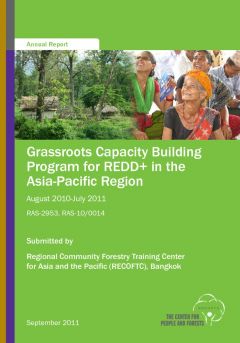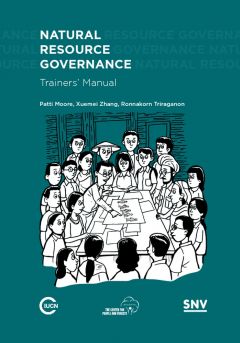Location
RECOFTC
RECOFTC is derived from an abbreviated form of the organization's legal name, Regional Community Forestry Training Center for Asia and the Pacific. Formerly the organization was known as RECOFTC – The Center for People and Forests.
RECOFTC – The Center for People and Forests is an international not-for-profit organization that focuses on capacity building for community forestry in the Asia Pacific region. It advocates for the increased involvement of local communities living in and around forests - some 450 million people in Asia-Pacific - in the equitable and ecologically sustainable management of forest landscapes.
The Regional Community Forestry Training Center for Asia and the Pacific (RECOFTC) opened in Bangkok, Thailand, in March 1987 with support from the United Nations Food and Agriculture Organization, the Government of Switzerland (through the Asian Development Bank), and Thailand's Kasetsart University.
Community forestry is widely acknowledged as a powerful solution for many of the challenges facing local people and the wider society, especially in improving rural livelihoods, enhancing community governance and empowerment, transforming forest-related conflict, protecting and enhancing the environment, and helping to fight climate change. As a capacity-building organisation, RECOFTC improves the ability of people and organisations to conduct community forestry effectively and sustainably.
RECOFTC works toward its mission through four thematic areas:
- expanding community forestry
- people, forests and climate change
- transforming forest conflict
- securing local livelihoods.
Members:
Resources
Displaying 341 - 345 of 485Grassroots Capacity Building Program for REDD+ in the Asia-Pacific Region, Annual Report 2010 - 2011
This document highlights the key achievements and challenges of the "Grassroots Capacity Building for REDD+" project in the Asia-Pacific region from August 2010 to July 2011.
Forest Tenure in Asia: Status and Trends
This report is intended to provide an overview of forest tenure in Asia between 2002 and 2010, building on and updating previous regional tenure studies undertaken by the Rights and Resources Initiative (RRI; 2002, 2009), and RRI and the International Tropical Timber Organization (RRI/ITTO; 2009). It is supplemented by a set of country studies, which provide a more in-depth look at tenure statistics and trends in Cambodia, China, Indonesia, Nepal and Vietnam.
Natural Resource Governance Trainer's Manual
Governance is the keystone of sound natural resource management. Its core principles - accountability, transparency, participation, and the rule of law - are at the heart of the efforts being made at local, national, bilateral and multilateral levels to ensure that decisions that affect natural resources and resource users are well-informed and implemented equitably. There is a real need for all those who are involved in making and implementing decisions to understand the basic concepts and principles of governance and be able to apply them in their daily work.
Natural Resource Governance Trainer's Manual
Governance is the keystone of sound natural resource management. Its core principles - accountability, transparency, participation, and the rule of law - are at the heart of the efforts being made at local, national, bilateral and multilateral levels to ensure that decisions that affect natural resources and resource users are well-informed and implemented equitably. There is a real need for all those who are involved in making and implementing decisions to understand the basic concepts and principles of governance and be able to apply them in their daily work.
Natural Resource Governance Trainer's Manual
Governance is the keystone of sound natural resource management. Its core principles - accountability, transparency, participation, and the rule of law - are at the heart of the efforts being made at local, national, bilateral and multilateral levels to ensure that decisions that affect natural resources and resource users are well-informed and implemented equitably. There is a real need for all those who are involved in making and implementing decisions to understand the basic concepts and principles of governance and be able to apply them in their daily work.




